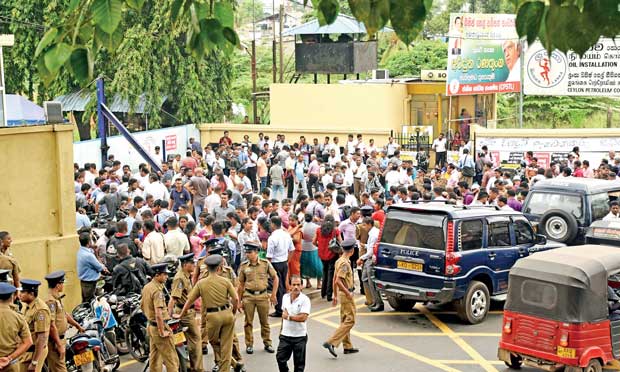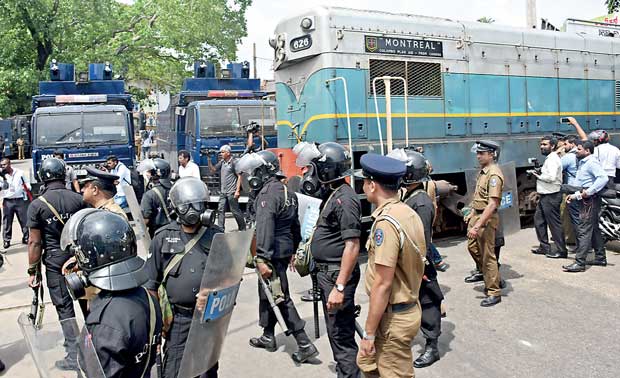The government weighs its options




All in all, the government won last week. The petrol strikers were put down after briefly flirting with uncertainty: we didn’t know what the officials would do, and frankly we were worried they wouldn’t do anything. By resolving their issue without resorting to brute force (for the first time, our president made significant use of those extraordinary powers vested in him by declaring the distribution of fuel an essential service), the bad guys were demarcated as the strikers. Not the government. This was and is true also for the University students: we have grown so used to their rhetoric over SAITM that we are merely tired whenever they demand action on the streets.
- The truth is that we’ve been selling ourselves for the past 60 years. The truth is that this government is no different to its predecessors.
- Everything that the previous government had a hand in shaping, including SAITM and the sell-out to China and Wilpattu, was effectively turned into campaigns against the President and the Prime Minister.
- Most of these protesters have actually subverted their own aims. Fuel has come to be something of a necessity to the entire country,
- Constitutional amendments are to this government what protests against them are to the Joint Opposition.
- The fuel strike wasn’t totally unsuccessful, as I pointed out earlier. But it did teach us some lessons. Pertinent, timeless lessons. Predominantly in the political sphere. We can choose to heed them, or we can choose to ignore. Either way, we’ve lost.
“Sri Lanka to sign Port Deal with China!” screams the headlines from the New York Times, The Guardian, and The Economic Times. The petrol strike was a corollary to what was perceived as the government’s sell-out of strategic assets to foreign entities, which proved so controversial, in fact, that while the strike was ongoing we ended up revising the terms of the agreement with China (regarding the Hambantota Port) from an 80:20 share distribution to a 69.55:30.45, divided between China Merchants Port and the Sri Lanka Ports Authority. So the strike wasn’t totally unsuccessfully: we brought up our share of the lease by 10.45 percentage points.
 Notwithstanding the way they inconvenienced the public, and any future action they may take to inconvenience us even further, I personally think they were trying to make an important point. You may argue (as Rajitha Senaratne did at a press conference) that Mahinda Rajapaksa is behind these strikes, that he is financing them with the money he looted from the public coffers (or the deals he struck to build those roads even those who hate him admire), but the truth is that when a set of impoverished, hard-done-by state workers resort to the streets despite the threat of dismissal, they deserve more than a passing glance. Nobody has spoken for them. The truth is that nobody wants to. As I noted in my column last week, we are so shrouded in ambivalence that even those who strike in our country’s name are laid aside.
Notwithstanding the way they inconvenienced the public, and any future action they may take to inconvenience us even further, I personally think they were trying to make an important point. You may argue (as Rajitha Senaratne did at a press conference) that Mahinda Rajapaksa is behind these strikes, that he is financing them with the money he looted from the public coffers (or the deals he struck to build those roads even those who hate him admire), but the truth is that when a set of impoverished, hard-done-by state workers resort to the streets despite the threat of dismissal, they deserve more than a passing glance. Nobody has spoken for them. The truth is that nobody wants to. As I noted in my column last week, we are so shrouded in ambivalence that even those who strike in our country’s name are laid aside. The truth is that we’ve been selling ourselves for the past 60 years. The truth is that this government is no different to its predecessors. But the protesters aren’t bemoaning that. They should be, but they aren’t. They are not shouting about the process, but about those who are heading that process. In that sense, these protests are politically motivated. And in that sense, those who chose to remain silent when the previous regime capitulated with the SAITM issue are being selective now.
Forget this though. In politics there’s something called the opportune moment. Protest campaigns and feel-good slogans are based on that moment. Everything that the previous government had a hand in shaping, including SAITM and the sell-out to China and Wilpattu, was effectively turned into campaigns against the President and the Prime Minister. For the record, they have not been unsuccessful there. Those who have through articles or speeches compelled the state to take a firmer hand against the protesters are, by that logic, caving into what the Joint Opposition wants them to do: diminish their own legitimacy by doing more of what they did in their time.
Given this it’s no surprise that the government is weighing its options. Trade Unions aren’t elected representatives: they are selected, sometimes by secret ballot, and they can’t speak for the people. The State knows this, which is why it claims that pressure groups can’t override what the people want. But what do the people want? Roughly the same thing the State wants! Its friends are ours, its
 enemies are ours. The Bills it enacts, the legislation it crystallises and later amends, are all ours. It would be subverting the very basis of democracy if we were to let Trade Unions dictate to the State. And to a considerable extent, we would be inclined to agree.
enemies are ours. The Bills it enacts, the legislation it crystallises and later amends, are all ours. It would be subverting the very basis of democracy if we were to let Trade Unions dictate to the State. And to a considerable extent, we would be inclined to agree. These protests are not achieving what they set out to do, not surprisingly. The stark truth is that whatever the protest may be, unless we’re in a totalitarian Orwellian dictatorship, all their arguments, regardless of how cogent they may be, can be trivialised with the simple counterargument “But you don’t represent the people!” Unless you count a particularly unique political predicament (think of Chandrika Kumaratunga’s clumsy handling of the war and the subsequent shift of power in and outside parliament to the Jathika Hela Urumaya, regardless of their numbers), an outside pressure group cannot and will not be allowed to influence State policy.
Trade Unions aren’t elected representatives: they are selected, sometimes by secret ballot, and they can’t speak for the people. The State knows this, which is why it claims that pressure groups can’t override what the people want. But what do the people want? Roughly the same thing the State wants!
And that’s not all. Most of these protesters have actually subverted their own aims. Fuel has come to be something of a necessity to the entire country, as have doctors and engineers and bus drivers, but these have a considerable impact on the poor. The middle classes will be squeezed beyond endurance when petrol stations run out of petrol, but when doctors vacate their hospitals their absence will be felt mostly by the not-so-affluent, i.e. those who can’t afford to visit a private hospital. The government’s enemy is not the people’s enemy, certainly not all the time. But when you have doctors out of hospitals and when the generator that fuelled up the garment factory you earned your daily stipend from runs out of diesel, you do tend to worry more about your economic plight. We are selfish, yes. But so is everyone else.
When a prominent yahapalanist Marxist and apologist (yes, they are both, sometimes at the same time) contended some months back that the government must address grievances through constitutional amendments and affirmative legislative enactments, I fired back contending that the ordinary Sinhalese, Tamil, Muslim, Burgher, and whatever-else man, woman, and child on the street will not bother about them without first thinking of his or her daily bread. Constitutional amendments are all fine and well, but without the necessary economic backdrop to them, they will run out of fuel. Now it would be hypocritical of me to suggest that this doesn’t hold valid for the other side: i.e. the nationalist, anti-federalist, and anti-yahapalana side.
In the end, these protests will only deepen political rifts. Those who support the government, while not exactly salivating over it, will see Rajapaksa and his cohorts behind the protesters
Constitutional amendments are to this government what protests against them are to the Joint Opposition. In both cases, what is ignored is the simple fact that the people will not be placated by political slogans if their economic needs aren’t met. When it comes to the middle class especially (because the middle class has become more politically empowered), no amount of feel-good rhetoric about the future of the country will move them. This means, whether we like it or not, that no amount of fuel strikes and power cuts will awaken the nationalist in us until and unless we can be sure that the economic prerequisites to being a nationalist are fulfilled.
In the end these protests will only deepen political rifts. Those who support the government, while not exactly salivating over it, will see Rajapaksa and his cohorts behind the protesters. Those who support the Rajapaksa Cabal, and especially those fiercely attached to it, will lambast the government whenever the CEB decides to cut power. We don’t need that, clearly. We need a pressure group movement that’s better organised, not prone to frequent strikes, and who’re genuinely concerned about this country’s plight without ignoring its need for an economic backdrop.
Regrettable, but that’s the way it is. In the eighties the conventional wisdom was that the economy was more important than the country, which explains why an entire generation grew up hating the arts, ignoring our history, and rubbishing our heritage
And why? Because that backdrop is what conditions us. Regrettable, but that’s the way it is. In the eighties the conventional wisdom was that the economy was more important than the country, which explains why an entire generation grew up hating the arts, ignoring our history, and rubbishing our heritage. “Culture can be salvaged only by selling it!” was what our leaders propagated around town, and we swallowed the pill they gave us. We are still paying for those sins, but until we stop paying, and until we let go of that inferiority complex and colonial hangover we suffer from even today, the truth is that we will continue to be ruffled, troubled, and altered by economics. When that petrol station runs out of fuel, when food shortages and power cuts are the order of the day, and when the generator at your office shuts down and with it your office too, we will eventually bother less about the country.
The fuel strike wasn’t totally unsuccessful, as I pointed out earlier. But it did teach us some lessons. Pertinent, timeless lessons. Predominantly in the political sphere. We can choose to heed them, or we can choose to ignore. Either way, we’ve lost.

